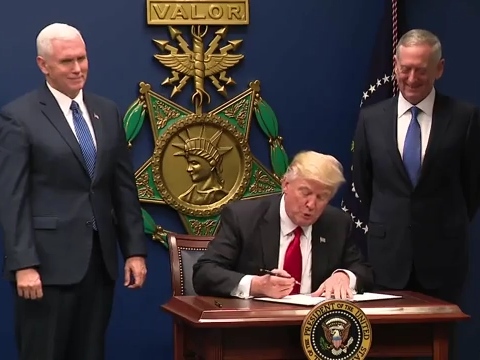
Advertisement
As expected, President Donald J. Trump signed an executive order for a new travel ban on Monday, after his last order was blocked by a federal judge in Washington, a ruling which was then upheld by the 9th Circuit Court of Appeals.
The travel ban, which was announced by Secretary of State Rex Tillerman, dropped Iraq from the list of seven countries named in Trump’s original order. The decision to de-list Iraq came after intense diplomatic pushback by Iraqi officials who claimed that many of the country’s citizens risked – and lost – their lives assisting U.S. troops in their fight against the Islamic State and other terrorist factions.
During his announcement, Tillerson said the president was exercising his “rightful authority” to issue the order, to keep Americans safe. He also asked U.S. allies to understand that the the order is part of America’s attempt to reduce vulnerabilities that may be exploited by international terrorist groups to infiltrate.
Tillerson also said that the administration has briefed key members of Congress and the media, and that discussions would continue this afternoon and throughout the week.
Attorney General Jeff Sessions, meanwhile, reiterated the secretary of state’s emphasis that the president has the constitutional authority and obligation to protect the country. He also noted that currently some 300 refugees that have come to the U.S. are being probed by the FBI for potential terrorist activities. (RELATED: Refugees continue pouring in after judge blocked Trump travel ban.)

Sessions also said that the government would implement enhanced screening of the six countries named in the order, three of which include state sponsors of terrorism. This would not only protect American citizens but also migrants allowed to enter.
The AG noted that the new order, like the last one, would provide a much-needed pause in refugee and migrant resettlement policies from war-torn, terrorism-infested countries in the Middle East begun under the Obama administration.
Following Sessions, Department of Homeland Security Secretary John Kelly noted that a lot has changed since the Sept. 11, 2001, attacks, in which 19 terrorists – most of whom originated from Saudi Arabia – flew jet airliners into both towers of the World Trade Center and the Pentagon, killing nearly 3,000 Americans.
“We cannot risk the prospect of malevolent actors using the immigration system to take American lives,” Kelly said, noting that terrorist groups often use American freedoms and generosities against us. The new order, he added, addresses many of those long-standing concerns regarding the security of the American immigration system.
There is one additional change to the order, and it wasn’t well-received by some conservatives. The new order does not give Christian refugees living in Muslim-majority countries on the list priority; this was likely dropped over the federal court’s concerns that it was imposing a religious litmus test and discriminated against Muslims.
“The White House repeatedly said Christian refugees under genocide would get priority,” tweeted TownHall.com editor and Fox News contributor Katie Pavlich. “This executive order strips that priority.”
The White House repeatedly said Christian refugees under genocide would get priority. This executive order strips that priority.
— Katie Pavlich (@KatiePavlich) March 6, 2017
The American Civil Liberties Union, one of the most vocal in opposition of the first order, said nothing much has changed with the second one, which the group still opposes.
“The Trump administration has conceded that its original Muslim ban was indefensible. Unfortunately, it has replaced it with a scaled-back version that shares the same fatal flaws,” the organization said in a statement. “The only way to actually fix the Muslim ban is not to have a Muslim ban. Instead, President Trump has recommitted himself to religious discrimination, and he can expect continued disapproval from both the courts and the people.”
Actually, Trump’s orders were never “Muslim bans” – that was completely fabricated by the Alt-Left so as to give it a premise to oppose his presidential authority. (RELATED: FACT CHECK: So-called “Muslim ban” doesn’t even effect 87% of the world’s 1.6 billion Muslim population)
As reported by Fox News prior to the formal announcement by the White House, the new order was tailored to address the court’s concerns, though legal experts and analysts said that the federal judge, James Robart, pointed out at the time that the president, and not the courts, has constitutional authority to implement national security policy.
“Terrorism is clearly a danger for America and our people,” said Sessions. “The president gets briefings on these dangers and emerging threats on a regular basis.
“Knowing the president would possess such extensive information, our founders wisely gave the Executive Branch the authority and duty to protect the nation,” he continued. “This executive order is a proper exercise of that power.”
Nevertheless, expect the Alt-Left – which has never met a terrorist they didn’t love – to once more take the administration to court in an attempt to continue putting our nation at risk.
J.D. Heyes is a senior writer for NaturalNews.com and NewsTarget.com, as well as editor of The National Sentinel.
Sources:
Submit a correction >>
This article may contain statements that reflect the opinion of the author
Advertisement
Advertisements















